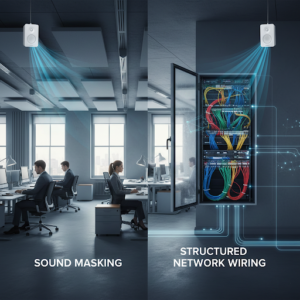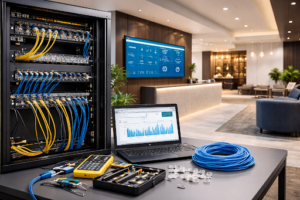Security cameras are a must for keeping homes and businesses safe in Texas, but the laws around them can be tricky. Whether you’re installing surveillance cameras in Dallas or setting up a system in North Texas, knowing the rules is key to staying legal. Texas security camera laws balance protection with privacy, so you can monitor your property without crossing lines. From homeowners curious about residential video surveillance laws to employers wondering about workplace monitoring, this guide has you covered. At Innovative Security Controls, we’ve installed countless systems in McKinney and beyond, and we’re here to walk you through it. Ready to understand surveillance camera laws in Texas for 2025? Here’s what you need to know to secure your space the right way—legally and effectively.
Are Security Cameras Legal in Texas?
Yes, you can install security cameras on your private property in Texas—home or business—as long as you follow some ground rules. The law’s clear: recording’s fine where privacy isn’t expected, like driveways, storefronts, or parking lots. Texas Penal Code § 21.15 bans filming in private spots—like bathrooms or someone’s bedroom—without consent. So, if you’re setting up CCTV cameras, keep them pointed at your own space. A Dallas homeowner can watch their porch, but not their neighbor’s backyard. Businesses can cover entrances, just not locker rooms. Wondering about camera laws on private property? As long as it’s yours and you’re not snooping, you’re good. Our McKinney team installs systems that stick to these security camera rules, keeping you compliant and covered.
Audio and Video Recording Rules in Texas
Texas has a “one-party consent” law for audio. If you’re in the conversation—or someone else agrees—you can record it. Adding audio to your Texas video surveillance? Let people know, especially at work. Video’s simpler: no consent needed in public areas like a shop floor or front yard. A sign saying “Under Surveillance” is a smart move for businesses—it’s not required, but it avoids fuss. Homeowners with doorbell cameras should note the audio rule too. Whether it’s Texas surveillance and security for an apartment or a store, these laws keep things straightforward. Stick to them, and your setup’s legal.
Texas Security Camera Laws for Businesses
Businesses in Dallas and across Texas use cameras to stop theft and keep an eye on things, but there are rules. You can monitor workspaces, entrances, and common areas—no problem. Private spots like bathrooms or break rooms? Off-limits, per workplace privacy laws. Telling employees about cameras isn’t mandatory, but it’s a good idea for trust. Customers? A “Video Monitoring in Progress” sign works wonders. Business security camera laws in Texas are strict about respecting boundaries—break them, and you risk fines. Our security camera installation in North Texas ensures your system follows these regulations, whether it’s a small shop or a big office.
Home Security Camera Laws in Texas
Homeowners have flexibility with cameras in Texas. You can watch your property—yards, garages, porches—as long as it’s yours. The catch? Don’t aim at neighbors’ private areas, like windows or backyards; that’s where laws on surveillance cameras at home kick in. Doorbell cameras with audio fall under the one-party consent rule—someone in the chat needs to know it’s recording. Apartment security camera laws in Texas follow the same logic: your space, your rules, but no peeking elsewhere. Curious if it’s legal to have cameras in your house? Absolutely, if they’re focused on your domain. We install systems in McKinney that respect these residential security camera laws, keeping your home safe and legal.
Can Employers Monitor Employees in Texas?
Yes, employers can use cameras to monitor employees, but there’s a line. Workspaces, entrances, and exits are fair game—think Texas video camera security over a cash register. Private areas like break rooms or bathrooms? Illegal, full stop. Cameras in the workplace employee rights in Texas don’t require consent, but letting staff know builds transparency. It’s not just about what’s legal—it’s about what’s fair. Our North Texas installations balance security with respect, ensuring your business stays compliant without overstepping.
Staying Legal with Surveillance Cameras
To keep your Texas surveillance security legal, follow these tips. Post signs for business cameras—“This Area Is Monitored” works. Avoid private zones—restrooms, neighbors’ yards, or anywhere off-limits. Hire pros who get security camera regulations; our McKinney crew positions systems right. For audio, stick to one-party consent. Laws on CCTV or Texas remote camera monitoring don’t have to be a maze—these steps simplify it. Whether it’s a home or business, compliance means peace of mind.
Smart Security Options in Texas
Modern cameras bring extras like AI facial recognition, night vision, and app-based Texas video surveillance. Cloud storage and motion alerts make them even better. These upgrades fit within Texas surveillance laws, enhancing protection for homes and businesses. Want Texas security camera monitoring that’s cutting-edge yet legal? We’ve got you covered in North Texas.
Final Thoughts
Texas security camera laws in 2025 are all about balancing safety and privacy. Whether it’s home security camera laws in Texas or business rules, knowing what’s legal keeps you in the clear. From Dallas to McKinney, our professional installations make it easy. Ready to set up a system that follows the law? Call Innovative Security Controls at [phone] or hit us up online for expert help.





